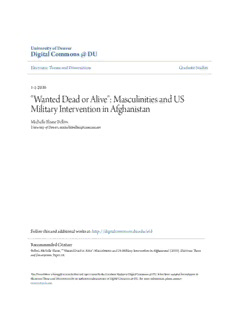
"Wanted Dead or Alive": Masculinities and US Military Intervention in Afghanistan PDF
Preview "Wanted Dead or Alive": Masculinities and US Military Intervention in Afghanistan
UUnniivveerrssiittyy ooff DDeennvveerr DDiiggiittaall CCoommmmoonnss @@ DDUU Electronic Theses and Dissertations Graduate Studies 6-1-2010 ""WWaanntteedd:: DDeeaadd oorr AAlliivvee"":: MMaassccuulliinniittiieess aanndd UUSS MMiilliittaarryy IInntteerrvveennttiioonn iinn AAffgghhaanniissttaann Michelle E. Bellini University of Denver Follow this and additional works at: https://digitalcommons.du.edu/etd Part of the International Relations Commons RReeccoommmmeennddeedd CCiittaattiioonn Bellini, Michelle E., ""Wanted: Dead or Alive": Masculinities and US Military Intervention in Afghanistan" (2010). Electronic Theses and Dissertations. 64. https://digitalcommons.du.edu/etd/64 This Dissertation is brought to you for free and open access by the Graduate Studies at Digital Commons @ DU. It has been accepted for inclusion in Electronic Theses and Dissertations by an authorized administrator of Digital Commons @ DU. For more information, please contact [email protected],[email protected]. ―WANTED: DEAD OR ALIVE‖ MASCULINITIES AND US MILITARY INTERVENTION IN AFGHANISTAN ______ A Dissertation Presented to The Faculty of the Josef Korbel School of International Studies University of Denver ______ In Partial Fulfillment Of the Requirements for the Degree Doctor of Philosophy ______ by Michelle E. Bellini June 2010 Advisor: Dr. Karen Feste ©Copyright by Michelle E. Bellini 2010 All Rights Reserved Author: Michelle E. Bellini Title: ―Wanted: Dead or Alive‖: Masculinities and US Military Intervention in Afghanistan Advisor: Dr. Karen Feste Degree Date: June, 2010 ABSTRACT Hegemonically masculine concepts are frequently employed by decision-makers during times of crisis and war. Language used by leaders is powerful in securing domestic support for US foreign policy decisions, and hegemonic masculinity shapes the ways in which leaders conceive of conflicts and in what ways those conflicts should be addressed. Notions of hegemonic masculinity exert a powerful, structural influence on US Presidential foreign policy decisionmaking. The attacks of September 11th, 2001 changed United States foreign policy in fundamental ways. This research examines the role of hegemonic masculinity in President George W. Bush‘s policy speeches, both how hegemonic masculinity may have shaped his language and how that language gave Bush the support he needed for unilateral intervention in Afghanistan. The research begins from a standpoint feminist perspective, and examines President George W. Bush‘s language in public speeches and statements released to the public on September 11, 2001 and in the six weeks following the attacks. The research includes a narrative examination of Bush and how he understood international politics with regard to hegemonic masculinity, and a narrative of how Bush employed gendered language when speaking about the US intervention in Afghanistan. The language used by President Bush is examined in detail, regarding his references to power, rescuer, and iii warrior in his speeches and statements before and after the 9/11 attacks. Both quantitative and qualitative approaches were utilized to uncover how these three concepts were employed by President Bush before and after the terrorist attacks. President Bush relied heavily on conceptions of hegemonic masculinity in his language after September 11, 2001. In particular, he used gendered ideologies and narratives to bolster the case for unilateral intervention in Afghanistan, employing notions of power, rescuer, and warrior. Bush‘s use of the concepts of rescuer and warrior increased significantly after the terrorist attacks. Bush, in effect, remasculinized the United States through a hypermasculine response. These three concepts, power, rescuer, and warrior, were embraced by many Americans, and support for the US intervention in Afghanistan was overwhelming. Language is powerful, and Bush‘s use of specific language which referenced hegemonic masculinity was an essential component in his arguments for US military intervention in Afghanistan. iv Acknowledgments Special thanks to Lindsey Mott, for her invaluable assistance with the statistical analysis, and to Nicole Coonradt, for editing the manuscript. v Table of Contents Chapter One: Introduction………………………………….. 1 Chapter Two: A Gender Approach to Foreign Policy………. 9 Chapter Three: Masculinity Concepts in Foreign Policy…….. 25 Chapter Four: President George W. Bush as a Masculine Leader………………………………………… 69 Chapter Five: Intervention in Afghanistan as Masculine Foreign Policy………………………………... 101 Chapter Six: Masculinity Concepts in President Bush‘s Foreign Policy Speeches……………………… 141 Chapter Seven: Conclusion……………………………………. 248 Bibliography ………………………………………………… 258 Appendix A ………………………………………………… 267 Appendix B ………………………………………………… 269 vi List of Tables 1. Table One: ―Pre 9/11 Speeches‖ ……………………… 181 2. Table Two: ―Post 9/11 Speeches and Written Memorandum, Directives, and Statements‖ ………………. 183 vii List of Figures Figure One: References per Speech of Power, Rescuer, and Warrior ……………………………………… 184 viii Chapter One Introduction The world changed when terrorists attacked the United States on September 11, 2001. Nineteen terrorists hijacked four American airplanes early that morning, using them as bombs, flying two directly into the Twin Towers of the World Trade Center in New York City, and one into the Pentagon in Washington, D.C. The fourth plane, probably intended to hit the White House or the Capitol building, went down in a Pennsylvania field, allegedly after the passengers tried to overcome the hijackers. These attacks claimed thousands of lives, incurred costs in billions of dollars in damages, and devastated American financial and political symbols. The terrorist attacks on 9/11 were the first time since Pearl Harbor that the United States was attacked on its own soil, reshaping American foreign policy in profound and long-lasting ways. President George W. Bush, less than a year into his first term of office, was initially in shock. He spoke to the American people that day, and addressed the nation that evening, promising to find the alleged terrorists who had helped the hijackers and bring them to justice. The next two days, as the nation focused on the attacks and the recovery effort, Bush, with few public addresses, scrambled to put together a strategy to deal with the Islamic radicals who had perpetrated the attacks. The third day after the attack, Bush went on the offensive, speaking frequently about his intentions to find all who were involved in the attacks and to bring them to justice in the United States. During the week following the attack, Bush asserted American strength, proclaimed a 1
Description: